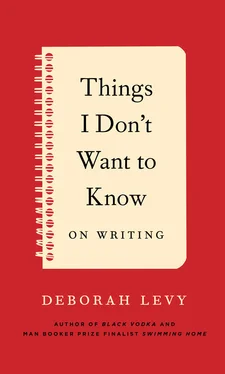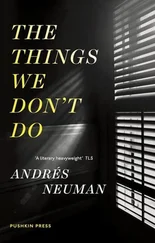Four. Aesthetic Enthusiasm
‘It is sometimes necessary to know where to stop.’ The Chinese shopkeeper had probably noticed that my hand was resting quite close to his shirt cuff when he said that. The palm trees outside the restaurant were covered in snow by the time we had finished our bottle of wine. In fact, the tracks and paths that mapped the way back to my hotel had more or less disappeared. He still had not told me his name. I had not told him mine either, although I knew he knew it because he’d read one of my books. For some reason, knowing each other’s names was something we did not want to know. He leaned over towards the German couple at the table nearby and congratulated them for having had the foresight to bring arctic clothing to Majorca in spring. ‘My friend here,’ he pointed to me, ‘is dressed for the beach’.
The German man began to tell us, in English, how they had encountered a snake on a hike in the mountains earlier that morning. It was lucky they were wearing boots. The snake was hiding in a crack in a rock. It might even have been a rattlesnake. Did we know that dead snakes can bite for up to an hour after their death?
‘Yes,’ the Chinese shopkeeper said, ‘I did know that.’ He turned to me and began to talk about soup again. He was obsessed with soup. Apparently, although he’d forgotten how to make one sort of Chinese soup, he still remembered how to make another sort. It was more like rice porridge than soup, very nourishing and warming in winter, and he liked to add sesame oil and pepper to it. I couldn’t help noticing that his hand was now resting quite close to my hand, and he might have noticed too, because of what he said next.
‘Now tell me, where do you think your skin is thinnest on the body?’
‘On the finger tips?’
‘No. I’ll tell you now. It is thinnest on the eyelids and it is thickest on the palms and soles.’
I laughed and he smiled. Then he laughed and I smiled. He said he missed the smell of roasted peanuts in China and he’d forgotten how to make the seafood kind of Chinese soup, but, he was very pleased he’d made a new life in the mountains of Majorca because that is where I had invited him to join me at my table for three. And then he nudged me because Maria had just walked in to the restaurant and was stamping the snow off her boots. She looked surprisingly tall in a heavy coat trimmed with fur. I waved to her and she made her way to our table. Maria was carrying a small suitcase in her gloved hand. Her face was stern and sad.
‘My brother told me you were cold in your room.’
‘Yes.’
‘I have moved you to another room. There are blankets on your bed.’
‘Thank you.’
‘Are you going somewhere Maria?’
‘Yes.’
Maria did not want to talk. Not at all.
I opened my bag and gave her the chocolate I had bought at the Chinese shopkeeper’s shop, ‘intensidad’, with the big 99 % on it. And then I counted out the rent for my hotel room, four nights in cash, because I thought she might need it for whatever she had to do next. She was pleased to take the cash. When she kissed my cheek I could feel her heart beating under her coat, fierce and roaring.
Later, when the Chinese shopkeeper walked me up the invisible mountain path to the hotel, he said again, ‘Sometimes in life, it’s not about knowing where to start, it’s knowing where to stop.’ He told me that when he was living in Paris all those years ago, he was lonely at the weekends, so he decided to take the train to Marseilles. He was walking near the port and the mistral was blowing and he hardly spoke any French, but when he saw two cops stop a North African boy, probably no more than ten years old, he stopped too. The boy was wearing a childish white cotton vest. It probably smelt of the soap powder his mother had washed it in. The cops lifted up his vest and started to punch his stomach. That was something he could not forget, the sight of adult men lifting up the vest of a child so as to hurt him more accurately. He found himself walking over to the boy who was tough and taking the punches, and he shouted to the cops in his funny Chinese French accent, ‘Stop, stop, stop, stop, stop.’ It was not exactly heroic but it was what he wanted them to do. They did stop. They stopped and walked away.
The Chinese shopkeeper said, ‘You will want to stop here because we have arrived at your hotel.’ We stopped by the terrace and his head moved closer to mine. I could see the silver in his black hair.
When we kissed, I knew we were both in the middle of some sort of catastrophe and I didn’t know if something was starting or if it was stopping. The collar of his big winter coat was wet where the snow was melting. He took off his coat and handed it to me. ‘If you go for a walk you will need it and I have another one. You need to dress properly for the weather you find yourself in.’
After a while, I walked up the marble stairs, past the large cactus that stood in a pot on the landing and up to the battered oak door of a room on the second floor. I opened the door with the key Maria had slipped in to my hand when I gave her the cash. It was smaller than my room upstairs. Folded neatly on the end of the bed were a pile of blankets, and placed in front of a window that looked out on to the ancient palm tree in the garden was a desk and chair. It had obviously been tricky to squeeze the desk in, but Maria had carried it through the door and pushed it between the window and the bed.
I had a view. I had a writing desk. The room was warm. Burning in the fire were three large logs. In a basket nearby were other logs stacked neatly on top of each other. The room was so warm I knew the logs had been burning for some time.
Maria had left in a rush. In a snowstorm. Had she outgrown this world she’d made up here in the mountains? Was she not looking forward to picking the lemons and oranges in the orchard she had irrigated? She had also planted the vegetables and olive trees and built the beehives from which she gathered the thick, aromatic honey she served at breakfast. It was Maria who baked the bread and ground the coffee beans. The logs that would keep me warm through the night were chopped by her too. Maria had left in a rage and without enough cash. Did she want to stride out on her own and get on with whatever it is she had to do next?
It occurred to me that both Maria and I were on the run in the twenty-first century, just like George Sand whose name was also Amantine was on the run in the nineteenth century, and Maria whose name was also Zama was looking for somewhere to recover and rest in the twentieth. We were on the run from the lies concealed in the language of politics, from myths about our character and our purpose in life. We were on the run from our own desires too probably, whatever they were. It was best to laugh it off.
The way we laugh. At our own desires. The way we mock ourselves. Before anyone else can. The way we are wired to kill. Ourselves. It doesn’t bear thinking about.
There was something else I did not want to think about. That afternoon, when I stood by the sea and laughed at myself under the snow clouds, what had come to mind was the piano in Maria’s hallway, the piano that was polished every day but never played. I did not want to know that I had been shut down like that piano. For some reason I remembered the way I used to eat oranges as a child in Johannesburg. First I had to find one that would fit into the palm of my hand. So I searched the sack in the pantry for a small orange because the small ones were the juiciest. Then I rolled the orange under my bare foot to make it soft. It took a long time and the point was to get the fruit to yield its juice and not to split. This had to be sensed entirely through the sole of the foot. My legs were brown and strong. I felt so powerful when I figured out how to use my strength on something as small as an orange. When it was ready I made a hole in the peel with my thumb and sucked out the sweet juice. This strange memory in turn reminded me of a line from a poem by Apollinaire. I had written down this line in the Polish notebook, twenty years ago: ‘The window opens like an orange.’
Читать дальше












